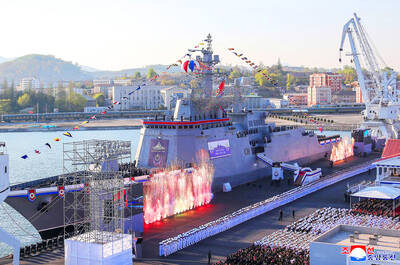Millions of air passengers face at least two more years of travel disruption under European commission proposals to deal with security issues raised by the carrying of liquids after the trans-Atlantic bomb plot.
A ban on carrying liquids in hand luggage will be lifted in 2012 for airports handling more than 10 million passengers a year, with smaller airports waiting until 2014, sources close to European security officials said. That would mean a family traveling from Stansted airport to Barcelona-Girona in Spain from 2012 would be able to carry as much drink, shampoo and perfume as they wanted on the outbound journey, but would have to dump or check in the liquids on the return leg.
“We believe that having one rule for passengers departing large airports and another rule for passengers leaving smaller airports is bound to cause confusion and uncertainty for the travelling public,” said Stephen Hogan, European director of government affairs at Rapiscan, an airport scanner manufacturer.
If the proposals are accepted, many of Britain’s major airports will be able to ease restrictions from 2012, including Heathrow, Gatwick, Stansted and Manchester.
Airports such as Edinburgh, Liverpool and East Midlands, which handle fewer than 10 million passengers a year, will order passengers to dump large liquid containers at security checkpoints until 2014.
However, small airports can join their larger peers in lifting restrictions in 2012 if they buy approved scanners that can detect suspect liquids.
Aviation industry sources said the option to lift restrictions earlier than 2014 for smaller airports was likely to sow more confusion among passengers, because some airports will still wait until the latest possible date before installing equipment that will cost millions of pounds.
Transfer passengers from non-EU countries will be allowed to carry liquids on to internal flights from next April, ending a restriction that has seen the impounding of duty free goods carried by visitors at checkpoints for connecting travelers.
The proposals were discussed at a meeting in Brussels last week of security officials from EU member states and will be subject to further consultation before being put to the European parliament.
The parliament has asked the commission to draft new guidelines by April 30, when current regulations expire.
Tough security guidelines were first introduced in the UK when the liquid bomb plot was foiled in 2006, limiting passengers to carrying liquids in containers with a capacity no greater than 100 milliliters. The restrictions have forced UK airports to spend at least US$160 million on enhanced security and passengers have suffered from lengthy security lines and loss of possessions.
Technology companies have urged the commission to lift restrictions following live scanner trials with machines capable of detecting suspect liquids. One machine already in use at Heathrow and other major airports, the aTix scanner, only requires a software upgrade to be capable of detecting liquid bombs.
“The technology exists. It is not unproven and it is not untested. There is no reason, from a technology perspective, not to remove the ban,” Hogan said.

Archeologists in Peru on Thursday said they found the 5,000-year-old remains of a noblewoman at the sacred city of Caral, revealing the important role played by women in the oldest center of civilization in the Americas. “What has been discovered corresponds to a woman who apparently had elevated status, an elite woman,” archeologist David Palomino said. The mummy was found in Aspero, a sacred site within the city of Caral that was a garbage dump for more than 30 years until becoming an archeological site in the 1990s. Palomino said the carefully preserved remains, dating to 3,000BC, contained skin, part of the

TRUMP EFFECT: The win capped one of the most dramatic turnarounds in Canadian political history after the Conservatives had led the Liberals by more than 20 points Canadian Prime Minister Mark Carney yesterday pledged to win US President Donald Trump’s trade war after winning Canada’s election and leading his Liberal Party to another term in power. Following a campaign dominated by Trump’s tariffs and annexation threats, Carney promised to chart “a new path forward” in a world “fundamentally changed” by a US that is newly hostile to free trade. “We are over the shock of the American betrayal, but we should never forget the lessons,” said Carney, who led the central banks of Canada and the UK before entering politics earlier this year. “We will win this trade war and

‘BODIES EVERYWHERE’: The incident occurred at a Filipino festival celebrating an anti-colonial leader, with the driver described as a ‘lone suspect’ known to police Canadian police arrested a man on Saturday after a car plowed into a street party in the western Canadian city of Vancouver, killing a number of people. Authorities said the incident happened shortly after 8pm in Vancouver’s Sunset on Fraser neighborhood as members of the Filipino community gathered to celebrate Lapu Lapu Day. The festival, which commemorates a Filipino anti-colonial leader from the 16th century, falls this year on the weekend before Canada’s election. A 30-year-old local man was arrested at the scene, Vancouver police wrote on X. The driver was a “lone suspect” known to police, a police spokesperson told journalists at the

North Korean leader Kim Jong-un has unveiled a new naval destroyer, claiming it as a significant advancement toward his goal of expanding the operational range and preemptive strike capabilities of his nuclear-armed military, state media said yesterday. North Korea’s state-run Korean Central News Agency (KCNA) said Kim attended the launching ceremony for the 5,000-tonne warship on Friday at the western port of Nampo. Kim framed the arms buildup as a response to perceived threats from the US and its allies in Asia, who have been expanding joint military exercises amid rising tensions over the North’s nuclear program. He added that the acquisition